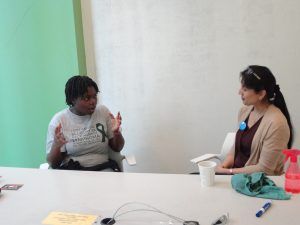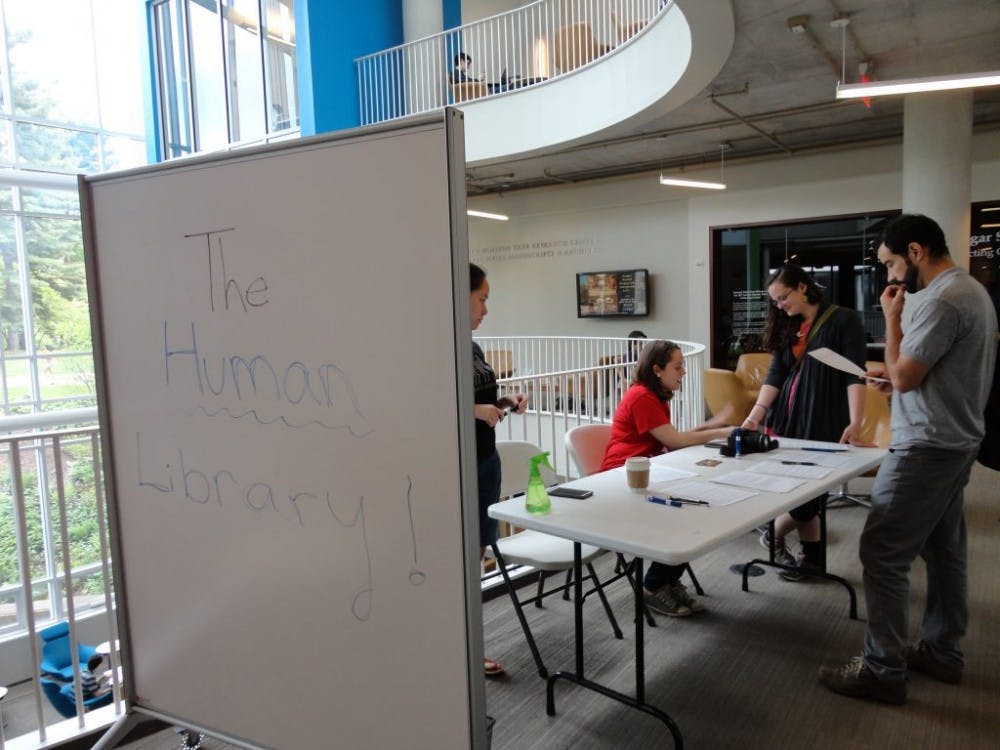The Human Library (HL), an event where people chosen as “books” talk to visitors about personal experiences with discrimination, took place in the Brody Learning Commons on Sunday.
The event, which was introduced to Hopkins last year by current senior Selma Ahmed, showcased 13 “books.” The first Human Library was founded in Denmark 15 years ago in the hopes of breaking down stereotypes through face-to-face interactions.
In an email to The News-Letter, Ahmed said that she and other organizers continued their efforts from last year to represent a variety of stigmatized groups.
“Since last year’s HL was so successful, we didn’t change too much,” she wrote. “Our books were AMAZING this year and represented so many facets of society that are stigmatized, so the experience was really rewarding to say the least.”
Book titles included “Black Jew,” “Transgender, Saudi Arabian, Agnostic,” “Transgender Teacher,” “Feminist-Atheist” and “Secretly Sick.” Ahmed also noted the differences in the process of obtaining books from last year.
“Instead of reaching out to local organizations and hustling for books, we received input from Howard County’s Public Library that they had about 10 books that would like to participate in our Human Library,” she said. “These books had already been prepped and primed from their experience in Howard County’s event, so they already understood what to expect with ours.”
Ed Mahoney, who struggled with and overcame obesity, said that his strained relationship with his father catalyzed his dependence on food.
“I was raised by a single mom and I was the oldest of four kids, and my dad was not a good guy,” Mahoney said. “He had demons he never dealt with, and unfortunately I got the brunt of it. Food was my comfort, it was part of who I was, and then it just got to a point where I just didn’t care.”
He further shared the insecurities he harbored while he was overweight.
“I wasn’t happy, but I wore a really good game face,” Mahoney said. “A lot of overweight people tend to be the life of the party or the big party animal. That’s because they don’t want you to get inside their head, they want you to think they’re doing great.”

Mahoney added that overweight people often use self-deprecation as a defense mechanism.
“We’ll try to make the joke that you’ll make about us before you can,” he said. “I made fun of myself more than I made fun of anyone. It was like a shield.”
Mahoney named his aunt, who is morbidly obese and faces many health problems, as the motivation for his three year weight loss journey.
“She let herself be that stereotypical fat person; she lived alone for 30 years and she lived through us,” he said. “She was the impetus because I didn’t want to go out like that.”
When Mahoney first started losing weight, he almost lost his life.
“I was basically anorexic because I just stopped eating,” he said. “I [contracted] cellulitis, and [my muscle] actually got infected.”
Although Mahoney briefly considered getting surgery to aid in the weight loss, his doctor recommended that he lose weight more gradually through moderate forms of exercise, such as taking the stairs to his office at work and doing isometric yoga at his desk.
Mahoney was not confident in going to the gym because he felt that he drew too much attention to himself.
“When you go to a gym and you’re big, everyone wants to help, which is great, but it’s also drawing attention to me the entire time I’m there,” he said. “You’re insecure, because you’ve been made fun of your entire life.”
Mahoney said his entire outlook on life changed when he began to lose weight. He realized the extent to which he had been discriminated against.
“I never realized that people were treating me based on how big I was,” he said. “I’m still the same person on the inside, the only thing that changed was how big I was.”
Losing weight has made Mahoney more self-confident and open towards others, and he began standing up for himself.
“People just assumed I was a pushover, a people pleaser,” he said. “So when I got more self-confidence, people [wondered] why I stood up for myself.”
Storm Hogan, another “book,” shared her experiences with postural orthostatic tachycardia syndrome (POTS), a disease that lowers her blood pressure when standing up and leaves her constantly fatigued.
Hogan had to drop out of high school when she was 16 because the school’s administration was unwilling to give her an Individualized Education Program (IEP), which would have provided the accommodations she needed to complete her high school education.
Because of her illness, Hogan suffered from depression. Though she eventually learned to cope with and accept her illness, she said this was initially a challenge.
“When you’re in the situation, you don’t get to analyze it, you just have to survive,” she said.
When interacting with people with invisible illnesses or disabilities, Hogan believes that the most important thing is to listen.
“Listening doesn’t just mean being quiet when somebody’s talking,” she said. “Listening means not deciding for them, not assuming that everyone you meet has the same privilege that you do.”
Ahmed felt that the Human Library played a therapeutic role for its books.
“Not only does the Human Library provide an outlet for the attendees to meet their biases, but it also provides a platform for our books to profess many of their grievances with being ‘misunderstood,’” she said.





